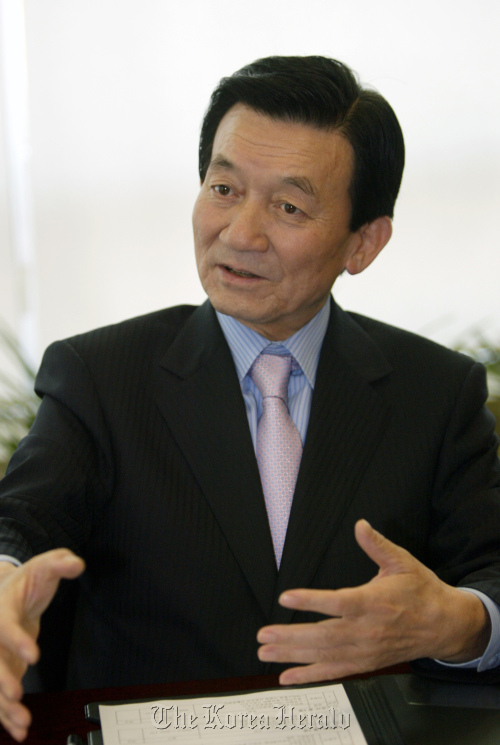City project head confident of drawing more branches and students from abroad
North London Collegiate School Jeju, the first international school in Jeju Global Education City, will open in five months.
By 2015, if all goes as planned, at least three prestigious international schools will have opened branch campuses in the government-financed, 3,794,000-square-meter city in Seogwipo.
Byon Jong-il, chairman of Jeju Free International City Development Center or JDC, a government agency responsible for implementing the city projects, explained the education city in a recent interview with The Korea Herald.
North London Collegiate School Jeju, the first international school in Jeju Global Education City, will open in five months.
By 2015, if all goes as planned, at least three prestigious international schools will have opened branch campuses in the government-financed, 3,794,000-square-meter city in Seogwipo.
Byon Jong-il, chairman of Jeju Free International City Development Center or JDC, a government agency responsible for implementing the city projects, explained the education city in a recent interview with The Korea Herald.

Question: What is the present situation of Jeju Global Education City?
Answer: North London Collegiate School Jeju is currently selecting students for its first class of 2011-2012, which will be finalized in May. The Jeju campus of the prestigious U.K. school will open in September, this year.
Branksome Hall, a highly esteemed school in Canada, has confirmed that it will establish its first overseas branch in Jeju and open it in the fall of 2012.

In addition to NLCS Jeju and Branksome Hall Asia, Noble & Greenough of the U.S. has signed an MOU to build a branch school in the city.
Q: Please introduce the schools which will open branches or have shown interest in establishing branches in Jeju Global Education City?
A: International private schools which will open a branch or have shown interest in establishing branches in JGEC are all top-class and globally well-known ones with strong competitiveness and high academic achievement.
For example, NLCS U.K. has a 160-year history of providing an outstanding education to students in the U.K. and has consistently ranked as the number one International Baccalaureate school in the U.K. for four years in a row, as announced by The Financial Times in March 2010. NLCS U.K. has also repeatedly outperformed other prestigious IB schools in terms of Oxbridge success rates; about 40 percent of its graduates enter Oxford and Cambridge universities. Of 80 students that scored perfect marks on the IB test held worldwide in 2010, three were NLCS students.
Branksome Hall, founded in 1903 and scheduled to open a campus in Jeju next year, is one of Canada’s most renowned private schools which runs an IB program in all grades starting with kindergarten. It is also a leading school in Canada, recognized for the outstanding academic performance of its graduates, 100 percent of whom go on to university, with 75 percent admitted to their first-choice university.
I believe some parents who are considering sending their children abroad to study may have heard of these schools’ reputations and many of them will educate their children in Jeju instead of sending them overseas, once NLCS Jeju opens.
Q: How will the schools be different from other international schools?
A: First of all, in JGEC, everyone ― students, teachers, administrators, doctors, store clerks ― will speak only English. JGEC, a project planned and implemented by the Korean government, allows its partner schools to offer their international education in English, so they will be able to use the same programs that are available in their home countries. The schools will award both a local (Korean) diploma and a diploma which can be recognized at their home countries, and their graduates are eligible to apply for schools in Korea or abroad.
NLCS Jeju will be coeducational, and its curricula will be based on those of NLCS UK. The school also will implement a coeducational IB program, which is widely used in admission evaluations by universities worldwide. If a student takes the IB program, highly recognized by universities around the world, he or she can enjoy various admission benefits such as priority admission, preferential admission and scholarships when enrolling in prestigious universities in the U.K., U.S. and Canada. Many renowned universities select their students based on an IB education. Jung Da-eun, a Korean student who got full marks in her IB program and graduated from NLCS London, has been studying at Harvard University in the U.S. for two years.
Q: What are the benefits of studying at JGEC-based schools instead of schools located abroad?
A: First of all, an international institute in the city will offer education in English, making it unnecessary to go abroad to study in English. In addition to international schools, the city will get diverse facilities ready to complement English education. They include a center for English teachers to practice and improve teaching methods, and an education, art and cultural complex that benchmark the Chautauqua Institution in New York City. The installations are intended to provide continuing education programs in English all year around. All government buildings, hospitals, and shopping centers will provide an environment for communication in English. Sites for foreign colleges and graduate schools have been set aside.
Second, the Korean government and JDC support school administrators in a bid to establish Jeju as an educational hub in Northeast Asia. I believe that the opening of NLCS Jeju and Branksome Hall Asia will demonstrate JGEC as the best place for English education and that the city will gain recognition as Northeast Asia’s educational hub.
Lastly, I would emphasize that Jeju’s beautiful natural environment is of a great help to a wide array of extracurricular activities. With Jeju’s natural environment and its ambitious plan to develop a free international city, JGEC is the perfect place in which to benefit from world-class educational programs without going abroad.
Q: What do you expect to see in JGEC in five years?
A: I expect an educational revolution to occur in Jeju and more international students will come and study in Jeju year after year. In five years, I see students coming to Jeju from China, Japan and other countries, to study further. I understand many Korean parents are worried that there will be only Korean students here, but I am confident that every year the number of international students will increase and that their children will experience and learn global perspectives in Jeju.

















![[KH Explains] Hyundai's full hybrid edge to pay off amid slow transition to pure EVs](http://res.heraldm.com/phpwas/restmb_idxmake.php?idx=652&simg=/content/image/2024/04/18/20240418050645_0.jpg&u=20240419100350)

![[Today’s K-pop] Zico drops snippet of collaboration with Jennie](http://res.heraldm.com/phpwas/restmb_idxmake.php?idx=642&simg=/content/image/2024/04/18/20240418050702_0.jpg&u=)